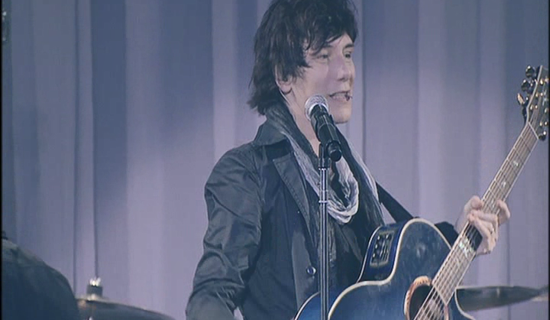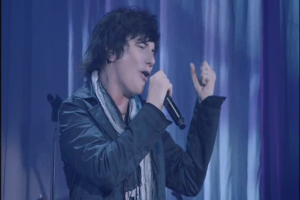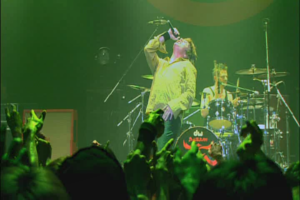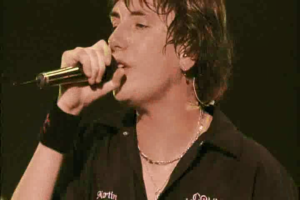Almost anyone that knows Eric Martin undoubtedly knows him as the singer for the rock band Mr. Big, that enjoyed such popularity in the early 90s for their mega hit “To Be With You”. Though they largely disappeared from the consciousness of the American music scene afterward, their popularity in Japan hasn’t really diminished. They still exist as a band today, and on the occasion that they do play in the US, you’ll usually find them at clubs. When they go to Japan, they sell out the Budokan. I could argue all day long about how “To Be With You” is not very representative of the band’s signature sound, and how they deserved to be far more popular in the US than they were, but I’m not here to talk about Mr. Big. I’m here to talk specifically about Eric Martin, and how he’s become a small but stand-out part of not only video game music, but Japanese music in general.
I remember being in Florida, in Daytona Beach Florida. And we’re playing a dive bar with saw dust and peanut shells on the ground, and the equipment is old…the PA and stuff like that. And we’re kinda coming in off the tour bus getting ready to play…and I go over to a pinball game, like I always do. A video game, or something. And I look up on a big screen in a bar, and it says “Now the number one song in the country, To Be With You”.
Martin’s involvement in video game music began right around the same time that CD-ROM and multi-media technology started moving into the home console market to show the world that not all game music needed to be synthesized. We could have tracks recorded with real instruments as well! And as an established rock singer and musician, it’s not at all surprising that this would have been what brought him in.
Sega published their first Spider-Man licensed game (just called “Spider-Man”, but also referred to as “The Amazing Spider-Man vs. The Kingpin”) in 1991 on the Sega Genesis/Mega Drive across all regions, and followed it up in 1993 with a sort of CD-ROM era “remake”: The Amazing Spider-Man vs. The Kingpin. This was released on the Sega/Mega CD only in Europe and the US, and essentially acts as a more modern “do-over” of the original game. The most notable additions were (horribly) animated cut-scenes, voice acting, sped-up gameplay, collectibles, extra levels, and a brand new Redbook Audio rock soundtrack.
By this time Spencer Nilsen was composing and producing music for these sorts of CD-ROM projects in-house for Sega, and already had the soundtracks under his belt for games like Batman Returns and Ecco the Dolphin for the Sega CD. When looking for a singer for the game’s theme song, Nilsen had heard Eric Martin (whom he had some mutual friends with) was a big Spider-Man fan, so it was relatively easy to get him involved in the project.
Though this game was released in 1993, the recording was most likely done in 1992, when Mr. Big was at the height of their popularity and touring for their “Lean into It” album. This was the album that featured “To Be With You”, which reached number one on the US Billboard charts, and number three in the UK. Martin was able to help write and record the song “Swing Time” with Nilsen between tour dates. The rest of the game’s soundtrack did not feature Martin, and was written by Nilsen and collaborator/rock keyboardist Dave Young. Apparently there was even a live performance of this at a Chicago CES show featuring Martin as well, but as far as I can tell no recording of this exists. This information all came from the interview with Nilsen in episode #116, “Sega CD with Spencer Nilsen”, of the fantastic video game music podcast “VGMpire”, which can be found here. I’d highly recommend it to anyone who likes video game music, and this episode in particular for more information on the soundtrack to this game, as well some some of Nilsen’s other soundtracks.
In late 1996 (US and Europe) and early 1997 (Japan) Sega would release a reworked version of their hit 1993 (arcade)/1995(Sega Saturn) racing game, Daytona USA. This Sega Saturn and Microsoft Windows only release was titled Daytona USA: Championship Circuit Edition (or just Daytona USA: Circuit Edition in Japan), and is somewhat divisive for fans of the series. Since the Sega Saturn port of the original was a launch title for the system that was also of noticeably inferior quality to the arcade original, it’s likely that it was a rush job to make it out for the system’s release. Championship Circuit Edition was an attempt to re-do all of that, and was worked on by the same team that was responsible for the Sega Saturn port of Sega Rally Championship (which is largely regarded to be a much better quality port). And though it was more technically impressive, it felt significantly different than many something with the Daytona USA name on it should.
One thing Championship Circuit Edition stayed true to the first installment in though, was the music. Daytona USA had an amazing soundtrack by Takenobu Mitsuyoshi, that was recorded as Red Book audio with real instruments and vocals for the Sega Saturn version (the arcade original had all of this digitized a Yamaha sound chip, which resulted in it sounding a bit more stunted). The soundtrack for Championship Circuit Edition was given to fellow Sega composer Jun Senoue, along with British composer Richard Jacques. Both had contributed to various Sonic the Hedgehog game soundtracks up until this point. The soundtrack featured several remixes of the classic songs from the first Daytona USA, as well as some original songs.
Though he’d only had a few chances to show show it with the Victory Goal series so far, Senoue was a rock musician through and through. And this is where Eric Martin comes in. At the time he probably would have been recording and/or writing for Mr. Big’s third album (and the final with original guitarist Paul Gilbert, until the reunion with the original lineup in 2009) Hey Man, but that didn’t stop Senoue from knowing that he wanted Martin for the American rock sound he was trying to achieve for Championship Circuit Edition. In this Gamasutra translated interview with Takenobu Mitsuyoshi, Jun Senoue, Richard Jacques, and the other members of “Sega Sound Unit H.” (that everyone reading this article really should go and read, by the way), Senoue stated that he had Martin in mind for the project from the start. He wanted a rock sound that wasn’t really available in Japan at the time, and Johnny Gioeli (the singer in Senoue’s band Crush 40) was friends with Martin. It’s unknown if Martin’s previous involvement with Sega of America played a part in this or not, but the collaboration happened.
It produced two tracks: The American Dream, and Sons of Angels. Senoue wrote the music, did the arrangement, and played guitar on both tracks. Martin wrote the lyrics for (along with song writer Andre Pessis) and sang both tracks. The American Dream was used during replays after the races, whereas Sons of Angels was used as the intro theme to the game that played during attract mode. These songs appeared on the soundtrack to Daytona USA: Championship Circuit Edition in Japan, but not on the Daytona USA anniversary compilation that was released some time after (probably due to licensing issues with Martin appearing in the songs). In 2009 though, newly re-recorded versions of both songs were included on a compilation of game music composed by Senoue, entitled “Jun Senoue: The Works”. Since the recordings are better and the arrangements slightly updated, these are definitely the versions to listen to.
Senoue would go on to compose more and more rock soundtracks for Sega games (and still does), but is probably most well known for the soundtracks to the two Sonic Adventure games. However Sega had a series of baseball games that started on the Sega Saturn in 1998 called “Pro yakyuu Team wo tsukurou!” (“Let’s Make a Pro Baseball Team!”) that continued on all the way until 2011 (the final game was a Yahoo browser game). Senoue did the soundtracks for part 3 on the PlayStation 2 (2005) and a remake of part 2 for the Nintendo DS (2009), and both soundtracks are amazing displays of Senoue’s talent. Martin was brought back in 2005 for two songs that appeared on the soundtrack to part 3: Batter Up! and Mr. Baseball. Both had music/arrangement/guitar done by Senoue, lyrics written by previously mentioned Crush 40 bandmate Johnny Gioeli, and vocals by Eric Martin. While Mr. Baseball is basically just a short musical sting, Batter Up! is very much a full out rock number, similar to what we heard in Daytona USA: Championship Circuit Edition.
Similar tracks appeared in the DS remake of part 2, with Senoue bringing in previous Sonic Adventure collaborator and rock singer Ted Poley and Terry Ilous. The real crime is that since these games never made it out of Japan, hardly anyone in the west knew that these songs ever even existed. On top of that, no official soundtracks were ever released. These tracks didn’t become available until the release of Jun Senoue’s aforementioned first compilation album, “Jun Senoue: The Works”, in 2009.
Here ends Martin’s involvement with game music, at least as far as I’m aware. His involvement with Japanese rock and pop music was just beginning though…
Though Mr. Big had already seen Paul Gilbert depart the group before the release of Get Over It in 1999 (to be replaced by Richie Kotzen), the group would officially announce their breakup in 2002 (after the release of the album Actual Size). The single from that album, Shine, was used as the ending song to the popular anime Hellsing, and Mr. Big had a farewell tour with dates all over Asia. This didn’t slow Martin down at all though, as he’d go right back to recording and releasing solo albums. He’d release two albums in 2002: I’m Goin’ Sane (a brand new studio album) and Pure (an album that featured new recordings of his past songs, but in acoustic form). Similar to Mr. Big, most of his popularity and sales seemed to remain in Asia.
His unexpected musical activities all began in 2003 though, when he contributed a cover of “genki wo dashite” called “Cheer Up” to the Mariya Takeuchi English language tribute album called “Sincerely…Mariya Takeuchi Songbook II”. Mariya Takeuchi is a very well known singer songwriter that started her career in 1978 (and incidentally is also married to another famous singer songwriter, Tatsuro Yamashita), and “genki wo dashite” is probably her biggest hit (or at least her most recognizable song). This would be a bit of a preview as to the direction his career would take for awhile, but we’ll get there…
In 2004 Martin recorded and released his next solo about, Destroy All Monsters. He toured for it, again mostly in Asia, and then something unexpected happened: He got a call from Tak Matsumoto, the guitarist from one of Japan’s foremost rock bands, B’z.
Shortly after that I think I made another solo album, and I toured. I toured in Japan. And then I got another phone call from Japan’s favorite son, Tak Matsumoto. “Mr. Tak Matsumoto”! And he called me, and I was a gigantic fan of B’z…He called me and said that he would like to do a solo album, but with an American rock feel, and do I know any players? And I picked some of my best friends. I loved being on tour with TMG, it was a great, great experience. Writing and recording with this great, phenomenal musician. And touring Japan…sold out, platinum records…oh my god it was great being back on top again, you know?
That group with an American rock feel was called Tak Matsumoto Group, or “TMG” for short. It was made of Tak Matsumoto on guitar, Eric Martin on vocals, Jack Blades (Night Ranger, Damn Yankees) on bass and additional vocals, and Brian Tichy (Ozzy Ozbourne, Billy Idol, Whitesnake, etc.) and Cindy Blackman (Lenny Kravitz, etc.) on drums for different tracks. Their first and only single, Oh Japan ~Our Time Is Now~, was released in March 2004. It was also the theme song for sports program TV Asahi Network Sports. The irony of a rock band with an “American feel” having their first single being one about the virtues of Japan is definitely a thing, but rumor has it that this was a request when composing the lyrics since the song had already been floated as a theme song to TV Asahi.
The album, TMG I, would come just a few months later, followed by a Japan-only tour that lasted just over one month. Chris Frazier (Whitesnake) was brought in as the touring drummer. They even made the rounds on a couple of popular Japanese music programs at the time: Music Station (of which their performance can be seen here in fairly poor quality) and Hey! Hey! Hey! Music Champ. Their appearance on Hey! Hey! Hey! didn’t feature Martin, due to him being back in America for the birth of his children. Consequently, Jack Blades had to handle all of the vocals in his place. Album track Never Good-Bye would also be used as a theme song for a 2004 Ultraman movie. After TMG’s activities wrapped up, Martin would lay low for a few years to spend time with his new family.
In 2008 the Japanese music industry would come calling again though, but this time in a completely different way…
And it was my publishing company and also Sony Music Japan that had this idea to come up with…well there’s many cover albums out there. And I’ve never done a cover album! I’ve done some cover songs in my day, but I’ve never done a full album of covers. They came calling…and their idea was for me, Eric Martin…and they felt like I was the ambassador to Japan. That’s what they called me! And immediately I went “OK! I’ll do it! You sold me!”. Would I be interested in doing a cover album of smash hit Japanese songs, but made popular by women. I thought it was a quiz! I thought it was a game show or something, when I first heard it. I went “You’re kidding, me? Me?! You think I can do it?”. And the record company said “We believe in you, but do what you do best. Just sing, be natural. Husky voice, edgy voice…be yourself, and sing these songs”. Like I said, the whole record in the beginning was a challenge. I’ve been a rock singer my whole life, but I like taking chances, and I do have that soul side. Even as a rocker, I’ve always approached it with soul. And so I did my very best and I did it from a man’s point of view, and in my own style. But after it was over, and after I recorded everything, I took a deep breath and I went “Oh man, I hope this works! I hope the Japanese fans are going to like it!”. If you believe in yourself, you can do good.
And true to the concept, the track list for “Mr. Vocalist” contained nothing but extremely well known hit Japanese songs, all performed by female artists. Of course the lyrics were all translated into English (though I personally feel that the translations that were used are pretty lacking in nuance compared to the original lyrics). They included “Pride” (By Miki Imai, and composed by rocker/husband Tomoyasu Hotei), “Hanamizuki” (By Hitoto You), “Everything” (By Misia), “Time Goes By” (By Every Little Thing), “M” (By Princess Princess), “I Believe” (By Ayaka), “Yuki no Hana” (By Mika Nakashima), and more. Pride was the album’s featured song (though it wasn’t released as a single or anything), as it had a music video produced for it, and is the song that Martin talks about spending the most time with during recording. This album did quite well in Japan, even reaching number one on the foreign music category of Japan’s Oricon rankings chart.
Going into 2009, an official Mr. Big reunion was announced with the group’s original lineup. Plans for the group to tour Japan that year and a promise of a new album were announced at that time as well. But despite the news, that was hardly the last we’d hear of Mr. Vocalist. The followup, “Mr. Vocalist 2”, would be released the following year, but this time it contained songs originally performed by women that were popular all over the world. All of the songs were originally sung in English, so no translation was necessary this time around. The track listing was voted on by fans, and it contains covers of songs such as “Time After Time” (By Cyndi Lauper), “My Heart Will Go On” (By Celine Dion), “I Will Always Love You” (By Whitney Houston), and many more. After the release of this album is when Martin would actually have some concerts (along with a backing band of various musicians and backup singers) throughout Japan, even releasing a DVD called “Mr. Vocalist ~A Special Night in Tokyo~”. It isn’t featured on the DVD (this is supposedly because Ayaka’s record company requested that it not be), but he even performed a duet of “I Believe” with Ayaka herself.
Later that year there was even a “Mr. Vocalist X’mas” album released as well, for everyone who’d been waiting to hear Eric Martin sing all of their Christmas favorites. To its credit it’s a little bit of an atypical mix, if for no other reason than it contains Christmas songs popular only in Japan (translated into English of course, similar to the first Mr. Vocalist album). It has the tracks you’d expect such as “White Christmas”, “Do They Know It’s Christmas”, and “Happy XMas (War Is Over”), along with tracks like “Shiroi Koibito tachi” (By Keisuke Kuwata), “Itsuka no Merry Christmas” (By B’z), “Christmas Eve” (By Tatsuro Yamashita), and more.
But if you thought the Mr. Vocalist train was running out of steam, you’d be wrong! “Mr. Vocalist 3” was released in 2010, returning largely to the theme of the first Mr. Vocalist album in that the songs were all originally performed by female Japanese artists. They were similarly big hit songs such as “First Love” (By Hikaru Utada), “Chijou no Hoshi” (By Miyuki Nakajima), and “Nada Sousou” (By Rimi Natsukawa). This album also featured a couple of guests: Japanese violinist Emiri Miyamoto played on “Mata kimi ni koishiteru” (By Fuyumi Sakamoto), and “Sekai juu no dare yori kitto” (By WANDS and Miho Nakayama) was sung as a duet with Debbie Gibson (Who this same year would get her own album in which she sang popular songs by male Japanese artists, “Ms. Vocalist”).
Martin would also participate in a tribute album to visual kei band Siam Shade (they had broken up in 2002) that featured all western artists (similarly to the previously mentioned Mariya Takeuchi album), “Siam Shade Tribute”. He performed a cover of their final single, “Love”. The album also included artists such as former Mr. Big guitarist Richie Kotzen, Sebastian Bach, Mark Slaughter, and Acid Black Cherry (the one Japanese artist to participate on this album). The recording for Mr. Big’s “What If…” album would also begin this year, and would be released early in 2011.
Fast forwarding to 2012, Martin would participate in a similar type of tribute album, but this time for L’Arc~en~Ciel. He covered hit single “Honey”, and the lineup on this album was even more bizarre than the last: Michael Monroe (formerly of glam band Hanoi Rocks), Boyz II Men, TLC, and Motley Crue’s Vince Neil were all featured. Japanese artists Polysics, SID, and Totalfat participated as well. Possibly because of the rock covers he’d recently done, “Mr. Rock Vocalist” was also released this year, putting a cap stone on the Mr. Vocalist series of albums. Unlike the previous ones though, this was nothing but songs by Japanese rock bands or solo artists, along with two original tracks for the album. It included “Yuuwaku” (by GLAY), “ANGEL” (By Kyosuke Himuro), and “Forever Love” (By X-Japan). It even featured some guests musicians: Steve Stevens came in for a cover of Boowy’s “Dreamin’”, Steve Salas for B’z’s “Alone”, Richie Kotzen for The Yellow Monkey’s “Rakuen”, and Marty Friedman for Luna Sea’s “I For You”.




